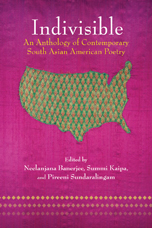
Indivisible: An Anthology of South Asian American Poetry, edited by Neelanjana Banerjee, Summi Kaipa, and Pireeni Sundaralingam | The University of Arkansas Press 2010 | $24.95
Indivisible: An Anthology of Contemporary South Asian American Poetry—the first anthology solely devoted to South Asian American poetry—features 49 poets and 141 poems from the newly emerging to the long-established, tracing their origins to Bangladesh, India, Nepal, Pakistan and Sri Lanka and spanning generations, cultures, and faiths. Released in April, the anthology is already making its mark, having at one point reached the #1 bestseller spot on Amazon for Asian American poetry. The editors and contributors have been doing readings and signings across the country, including a launch in San Francisco and a panel at this year’s AWP conference.
The anthology is edited by Neelanjana Banerjee, Summi Kaipa, and Pireeni Sundaralingam, three Bay Area poets who started the project in 2002. Initially designed as an initiative to collect community responses post-9/11, it soon expanded into a broader platform to express and reflect the complex and changing nature of South Asian American identities post-9/11. I spoke with Summi Kaipa, who explained that the title—taken from the Pledge of Allegiance—captures one of the tenets underlying the project: “how can we be a pluralistic society and get along and be unified at the same time.”
The editors were very intentional in the way they organized the collection, choosing not to categorize the contributors and pieces into specific genres or themes but instead to create a holistic experience in which the multiplicities of each new piece would lead into the next one. As Kaipa explained, the collection “capture[s] what the voice of South Asian identity is in the United States [along with] what the American experience is, what the experience is as a human being, you know, the universal experience.” And their vision is successful. What stands out are not common styles or recurring themes but the breadth and variation that exists amongst the poems, affirming that there is no single definition that quintessentializes the South Asian American experience.
The editors posit that while popular South Asian American literature continues to center around the more traditional immigrant narrative, South Asian American poetry allows for explorations of what it means to be a South Asian American in a more nuanced way. At a basic level, the forms engaged by the poets whose work is included in the anthology range from the traditional to the experimental, and are rooted in traditions from around the world. The anthology allows the reader to observe how the various styles that are being explored in American poetry are being reflected in South Asian writers. The only limitation, which the editors acknowledge, is that the anthology is not able to fully include the tremendous work being done in the spoken word and performance poetry realms.
The poems in the anthology explore a variety of themes, including the hazy nature of memory. Vandana Khanna confronts this in “Echo”, acknowledging the past is not always idyllic with her opening lines, “I cannot make it lovely, / this story of my father.” She suggests that stories are not always ours to tell: “You tell me over and over but I can’t write it: the same story, but I know we are leaving things out. Embellishing.” Ultimately, the poem accepts that we try to remember and share stories even if they are imprecise, and that we translate them into our time and place and language. In the last stanza, she writes, “You have left the spaces empty for me to add / in colors, the smells, to translate to English. / To translate into the present, into beautiful.”
The desire to relate to the unknown or imagined past is echoed in Vijay Seshadri’s four pieces (“The Disappearances”, “Elegy”, “The Dream I Didn’t Have”, “Memoir”), which all speak of absence in different ways. In “Elegy”, he opens with, “I’ve been asked to instruct you about the town you’ve gone to, / where I’ve never been” and in “Memoir”, he opens with, “Orwell says somewhere that no one ever writes the real story of their life. / The real story of a life is the story of its humiliations.” But his pieces also speak to a more poignant and personal loss. In “The Disappearances” he describes a world in which all living creatures have disappeared, suggesting that, for better or worse, all we leave behind are our memories:
[…]
The myths are somewhere else, but here are the meanings,
and you have to breathe them in
until they burn your throat
and peck at your brain with their intoxicated teeth.
This is you as seen by them, from the corner of an eye
(was that they way you were always seen?)
This is you when the President died
(the day is bright and cold).
This is you poking a ground-wasps’ nest.
This is you at the doorway, unobserved,
while your aunts and uncles keen over the body.
This is your first river, your first planetarium, your first popsicle.
[…]
While these examples speak to a universality of experience, no one example can be completely representative of the book’s project. At the outset, the editors had no idea where the project would lead but, as Kaipa put it, “the cacophony was important regardless of what it was.” Yet what makes the anthology significant is the deft work of the editors, who patiently and skillfully selected a wealth of experiences and styles that underlie the very fabric of South Asian America. In the end, their arrangement of the anthology allows the reader to see the unifying harmonies that exist. This anthology is a brave and important first step, gathering and weaving together the voices that are both defining and re-defining what it means to be South Asian American today.
This is Part 1 of a two-part series about Indivisible. Part 2 will appear in mid-July.